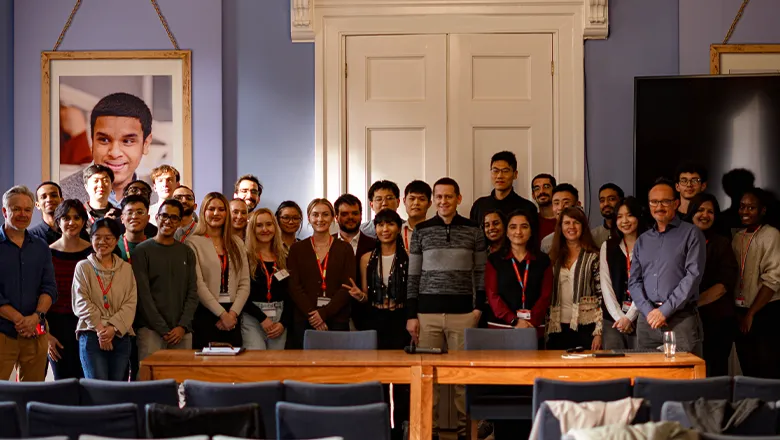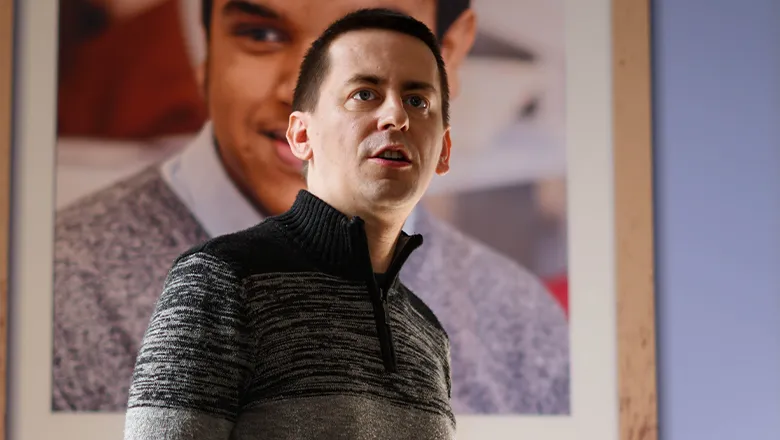Hearing John Jumper's lecture, especially after his Nobel Prize announcement, has been a truly inspiring experience and I will be telling stories about it for the rest of my life.
Tomas Solomon, EPSRC DRIVE-Health Student.
11 October 2024
New Nobel Prize winner comes to King's to speak with students
Dr John Jumper, one of the winners of the 2024 Nobel Prize for Chemistry, came to King’s College London the day after the announcement to talk to students.

Dr Jumper was awarded the world-famous prize on Wednesday for his work on protein structure understanding. He is a founding member of AlphaFold – an AI system developed by Google DeepMind that predicts a protein's 3D structure from its amino acid sequence.
AlphaFold allows anyone to predict the shapes and interactions of proteins from just knowing the order of their molecules, enabling researchers to study how they are linked to health and disease, and what kind of drugs might work with them.
Just over 24 hours from receiving his prize, Dr Jumper came to King’s to deliver a talk to doctoral students and researchers, sharing how while the team knew they were in the running for the prize, things were very much kept under wraps. This meant he only found out they had won 30 minutes before the announcement, and that it has been a “whirlwind” since.

In the audience were students enrolled on a Centre for Doctoral Training (CDT) programme in Data-Driven Health (EPSRC DRIVE-Health).
DRIVE-Health, led by co-directors Professor Richard Dobson and Professor Vasa Curcin, is training the next generation of PhD health data scientists, thanks to £7.9 million of match funding from the Engineering & Physical Sciences Council (EPSRC) and is the first health data science training centre in the UK to harness cross-sector collaboration across the NHS, industry, enterprise, policy makers, and academia.
The lecture explored the future of AI-driven biological research more broadly – sparking conversations into the potential of computational models in health and science – and delved into the world of AlphaFold.
One of AlphaFold’s strengths comes from the incorporation of existing knowledge, allowing us to do much more with far less data.
Professor Richard Dobson, Professor of Medical Bioinformatics
As part of the discussion, chaired by the first ever DRIVE-Health graduate Dr Jaya Chaturvedi, Dr Jumper spoke about the complexities of protein structures.
You should dislike something for its beauty. Because when it’s beautiful, then it’s probably a bit complicated. And when it’s complicated it makes it harder for you to implement another idea on top of it.
Dr John Jumper
The seminar featuring Dr Jumper was part of a series of events taking place this week to welcome the new cohort of EPSRC DRIVE-Health students. The students have had four full days of seminars, introductory training sessions, experiential events and workshops, held across four different King’s College London locations.
Over an eight year period, DRIVE-Health will train 85 PhD students in cohorts. By offering interdisciplinary training programmes, it equips data scientists with the practical knowledge and skills needed to navigate the intersection of healthcare, data science, and technology.
In this story
Related departments
- King's Doctoral College
- Faculty of Natural, Mathematical & Engineering Sciences
- Institute of Psychiatry, Psychology & Neuroscience
- School of Mental Health & Psychological Sciences
- Department of Biostatistics & Health Informatics
- Faculty of Life Sciences & Medicine
- School of Life Course & Population Sciences
- Department of Population Health Sciences
- King’s Institute for Artificial Intelligence


